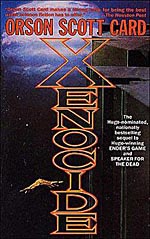
![]() verkisto
verkisto
7/26/2016
![]()
For some reason, I was under the impression that Speaker for the Dead would be a good stopping point for the series, based on what a friend of mine told me several years ago. I took it to heart, but as I was reading Speaker for the Dead, and really enjoying it, I went back and looked at some friends' ratings for the rest of the series, and found that the same friend had rated Xenocide and Children of the Mind fairly well, so here I am, finishing out that series.
(And no, I don't plan on reading the Shadow series. Even if my friends' comments and ratings weren't enough to give me pause, I don't like writers revisiting old series and retelling existing stories. It feels too much like a cash grab to me.)
Xenocide is an unusual book, since it winds up being more philosophical than anything else. There is a series of events taking place, and a plot developing, but the book reads more like it's an examination of identity and sentience than a traditional story. It's still fascinating and compelling, but after the high-paced previous two books in the series, I was taken a little by surprise.
Like the previous two novels, the story centers on the moral dilemmas faced by characters, and that seems to be a common theme in Card's works. Here, we see the characters from the previous book some 30 years in the future, faced with solving the problem of a starship being en route to the planet to blow it up, while trying to determine which sentient race to destroy in order to preserve the other races. The other half of the story is set on Path, a planet populated by Chinese immigrants from Earth, and their social structure based on the godspoken, who are people with OCD, and are believed to be speaking with the gods. It's a good read, with a lot of characters who become more distinctive in this volume, and it's another story that will keep you thinking beyond the end of the story.
I found the moral compass and obligations of the planet Path to be frustrating, because it's all about what's ordained by the gods, but that was intentional by the author. The people in power on Path seem to follow that edict blindly, and like Speaker for the Dead surprised me by being about acceptance over judgment, when Card himself doesn't seem to follow that path himself, he portrays that blind moral obligation in a negative light. I wouldn't have expected that from someone who comes across as so devout.
Overall, I've been very impressed with this series, especially beyond Ender's Game. I'm already reading Children of the Mind, and I don't expect to be disappointed with it.